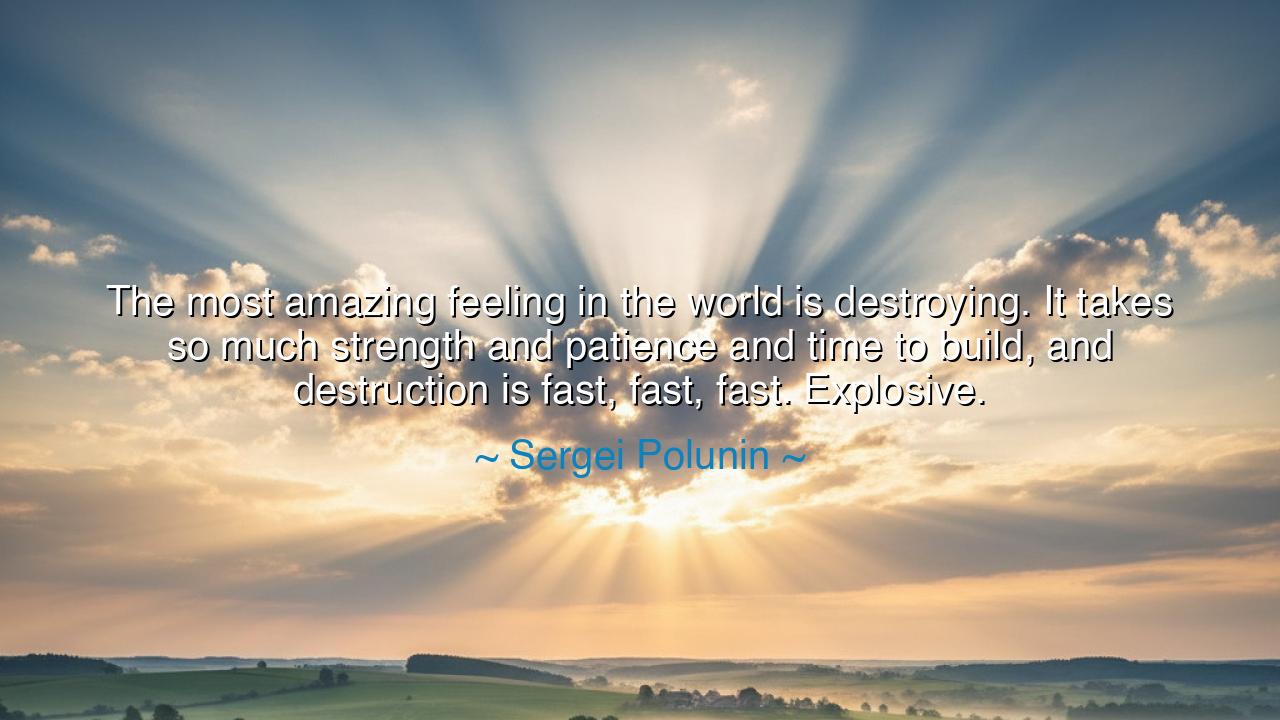
The most amazing feeling in the world is destroying. It takes so
The most amazing feeling in the world is destroying. It takes so much strength and patience and time to build, and destruction is fast, fast, fast. Explosive.






Hear, O listener, the words of Sergei Polunin, who with the fire of an artist and the turmoil of a warrior declares: “The most amazing feeling in the world is destroying. It takes so much strength and patience and time to build, and destruction is fast, fast, fast. Explosive.” This is no idle musing, but the cry of one who has felt both the labor of creation and the violent intoxication of tearing it all asunder. His words remind us that to build is the slow work of the earth, while to destroy is the sudden strike of lightning.
For the ancients, this truth was woven into their myths. From the Titans to the gods of fire, every culture knew that creation was a song that rose slowly, note by note, yet destruction came in the clap of thunder. To raise a temple took decades of sweat and stone; to reduce it to rubble required but the torch and a single night. Polunin, in his torment, reminds us that men are seduced by the swiftness of ruin, for it releases the raw power within, while patience is demanded only of the builders.
Recall the tale of the Library of Alexandria, where scholars had gathered the wisdom of the world. Generation after generation labored, transcribing scrolls, preserving thought, keeping alive the memory of civilizations. But when the flames came, years of toil vanished into smoke in a matter of hours. The builders had stretched across centuries; the destroyers, across minutes. Here lies the paradox that Polunin captures: what is explosive is often more intoxicating than what is enduring.
Yet do not misunderstand—he does not glorify ruin without thought. His words are a mirror to the human heart, which trembles between creation and destruction. To tear down may indeed feel amazing, for it unleashes force, frees energy, and awakens a dark ecstasy. But to give in only to the thrill of wreckage is to remain a child of chaos, never a parent of legacy. For even the warrior who burns the enemy’s city must one day face the silence of ashes and ask: What have I left behind?
And yet, the lesson of destruction is not only despair. For sometimes, the tearing down is necessary. Old walls must fall so new gardens may grow. A man must destroy the chains of his habits to become free. Nations must destroy tyrants to give birth to liberty. Even in nature, the forest fire clears the underbrush so stronger trees may rise. The thrill Polunin speaks of is the thrill of release—the explosive energy that clears the way for renewal.
Thus, O children of tomorrow, you must learn discernment. Do not fear destruction, but guide it. Ask yourself: am I breaking this to waste, or to rebuild anew? Am I burning in hatred, or am I making space for a greater dawn? To wield the power of destruction without wisdom is to be consumed by it. But to use it as a sword in service of creation is to become truly mighty.
So let the teaching be this: build with patience, with strength, with endurance. But when the time comes, do not cling too tightly to what is rotted or broken. Be unafraid to destroy—habits, fears, false idols, even entire ways of life—if in their ashes you will plant something truer, nobler, more enduring. And when you feel that sudden rush, that fast, fast, fast explosion, channel it not into emptiness but into a foundation for tomorrow.
For the world is both clay and fire. The wise man knows when to mold, and when to shatter. And if you, O listener, would be remembered, do not let your legacy be only in the ruins you leave, but in the temples that rise from their dust.






AAdministratorAdministrator
Welcome, honored guests. Please leave a comment, we will respond soon